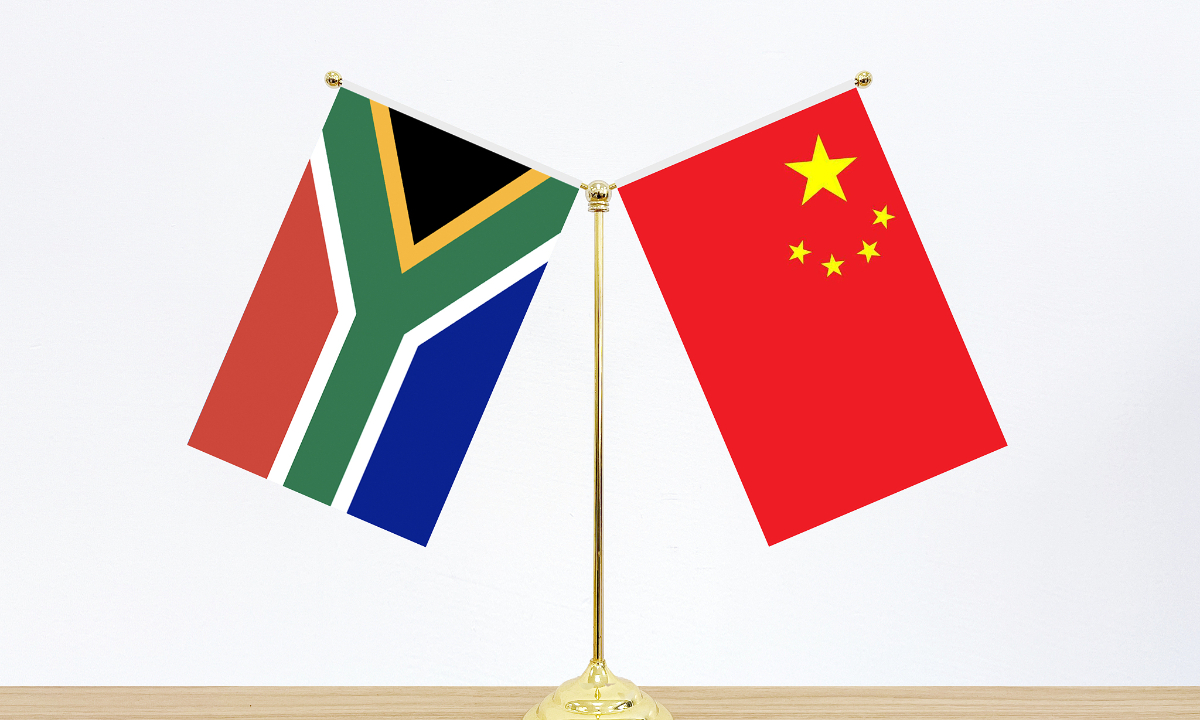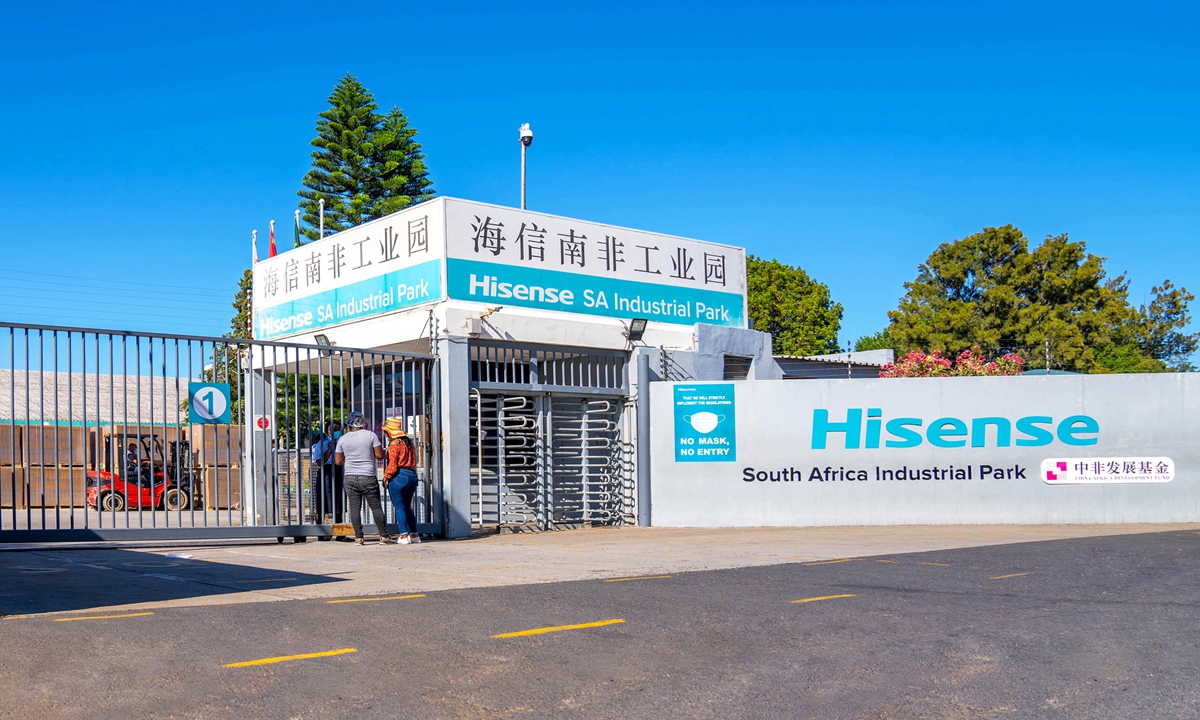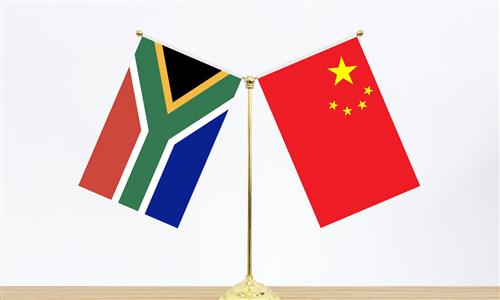China, South Africa enjoy vibrant economic ties, more pragmatic cooperation set to unleash enormous potential: expert

China South Africa Photo:VCG
China and South Africa, two member states of the BRICS bloc, have witnessed their economic ties get closer and bilateral trade follow a steady growth track in recent years despite the COVID-19 pandemic. With their strategic partnership deepening, bilateral cooperation in diverse areas has displayed vitality and resilience, setting a template for cooperation among the nations of the Global South and injecting impetus into the world's economic recovery.
South Africa is the country with the largest amount of Chinese investment in Africa, having attracted more than 170 Chinese firms in finance, home appliances, automobiles, mining, energy and other fields. The cumulative investment value has exceeded $10 billion, data from the Ministry of Commerce (MOFCOM) showed.
South Africa is also the African country that has invested the most in China, and the two sides have formed a stable and strong supply and industrial chain cooperative relationship.
Bilateral cooperation has not only targeted natural resources but also industry-related fields, with renewable energy becoming a highlight.
In July, Power China signed a deal for the Darmragt 123-megawatt photovoltaic (PV) project with Irish developer Mainstream, marking the first large-scale ground PV power plant project signed by a Chinese company in South Africa.
The project will provide about 300 million kilowatt hours of clean power to the South African national grid each year, offering robust support for solving the local power crisis.
Zhang Peiliang, South Africa chief representative of PowerChina International Group, told the Global Times on Tuesday that the project is close to the load center, which will help South Africa achieve energy diversification and reduce its dependence on traditional fossil fuels, and also provide a demonstration effect for South Africa's clean energy transition.
"It will lay a solid foundation for Chinese expertise and equipment entering South African's vast photovoltaic market. With more Chinese technologies landing, clean energy will become more popular in the African country," Zhang noted.
China and South Africa have enormous potential in the renewable energy sector.
Addressing the China-South Africa New Energy Investment and Cooperation Conference in Johannesburg on June 13, Chinese Ambassador to South Africa Chen Xiaodong said that both countries aim to accelerate their energy transitions and support economic sustainable development. It's an opportune moment to strengthen China-South Africa new-energy investment cooperation.
China will continue to support the development goals of South Africa's investment strategy, encourage powerful Chinese companies to leverage their advantages in technology, capital and talent, and actively explore cooperation opportunities in South Africa's renewable sector such as wind and solar, energy storage, power transmission and distribution, Chen remarked.
The South African government said in April that the country aims to mobilize about 2 trillion rand ($111 billion) in new investments over the 2023-2028 period, according to the Xinhua News Agency.
Apart from the vast potential to be released by energy cooperation, high-tech manufacturing is also powering the African country in promoting its industrialization. Made-in-South Africa has become a trend locally, as supported by Chinese brands.
The Hisense South African Industrial Park, jointly launched by the China-Africa Development Fund and China's electronic giant Hisense Group in 2013, has boosted manufacturing in Africa.

Photo: Courtesy of Hisense
In April 2022, refrigerators produced in the park began to be delivered to the British market, marking the first exports of "Made in South Africa" Hisense home appliances to the European market.
As a signature Belt and Road Initiative project, the park is the largest home appliance factory invested by a Chinese firm in South Africa over the past four decades.
The project has an annual output of 1 million TV sets and 500,000 refrigerators, and it has created more than 1,000 jobs. About 70 percent of the management positions are held by local employees, according to a note that Hisense sent to the Global Times.
A company representative told the Global Times on Tuesday that Hisense will expand investment in the park to continuously improve its production capacity.
Song Wei, a professor at the School of International Relations and Diplomacy at Beijing Foreign Studies University, told the Global Times on Tuesday that South Africa has been striving to improve its business climate in recent years, thus luring more foreign investment.
"The current bottleneck for South Africa's drive to promote economic industrialization is its weak infrastructure, and that's where Chinese firms could offer their advantages," Song said. Bilateral investment and cooperation could set a good template for countries and regions in the Global South and inject impetus into the world economy, said Song.
China has been South Africa's top trading partner for 14 consecutive years, while South Africa has been China's largest trading partner in Africa for 13 years in a row, according to MOFCOM data.
In 2022, bilateral trade expanded 5 percent year-on-year to $56.74 billion, hitting a new record. In the first half of 2023, growth of bilateral trade accelerated to 11.7 percent in year-on-year terms, MOFCOM data showed.



